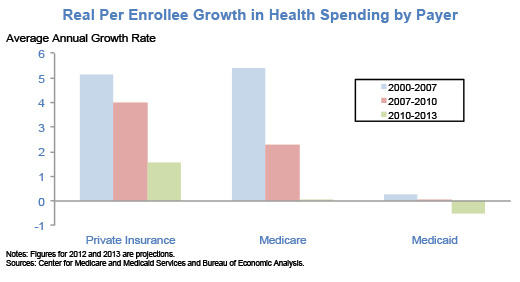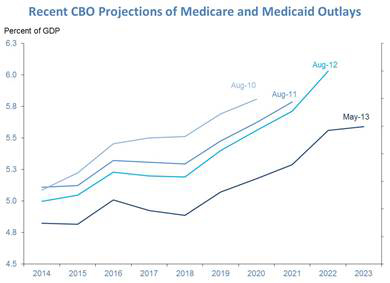New Report from the Council of Economic Advisers: The Recent Slowdown in Health Care Cost Growth and the Role of the Affordable Care Act
The Affordable Care Act (ACA) was passed against a backdrop of decades of rapid growth in health care spending, and one of the ACA’s key goals was to root out serious inefficiencies in the United States health care system that increase costs and compromise patients’ quality of care. Recent data show that health care spending and prices are growing at their slowest rates in decades; it appears that something has changed for the better. While this marked slowdown likely has many causes, and these causes are not yet fully understood, the available evidence suggests that the ACA is contributing to these trends, and, moreover, is helping to improve quality of care for patients. Today the White House Council of Economic Advisers released a new report analyzing recent trends in health costs, the forces driving those trends, and their likely economic benefits. Read the full report here.
Key points in today's report from the Council of Economic Advisers:
1. Health care spending is growing at the slowest rate on record: According to the most recent projections, real per capita health care spending has grown at an estimated average annual rate of just 1.3 percent over the three years since 2010. This is the lowest rate on record for any three-year period and less than one-third the long-term historical average stretching back to 1965. This slower growth in spending is reflected in Medicare, Medicaid, and private insurance.

2. Health care price inflation is at its lowest rate in 50 years: Measured using personal consumption expenditure price indices, inflation for health care goods and services is currently running at just 1 percent on a year-over-year basis, the lowest level since January 1962. (Health care inflation measured using the medical CPI is lower than at any time since September 1972.)
3. The slowdown in health care cost growth is not due solely to the Great Recession; something has changed: The fact that the health cost slowdown has persisted so long even as the economy is recovering, the fact that it is reflected in health care prices – not just utilization or coverage, and the fact that it has also shown up in Medicare – which is more insulated from economic trends, all imply that the current slowdown is the result of more than just the recession and its aftermath. Rather, the slowdown appears to reflect “structural” changes in the United States health care system, a conclusion consistent with a substantial body of recent research.
4. The ACA is contributing to the recent slow growth in health care prices and spending and is improving quality of care: ACA provisions that reduce Medicare overpayments to private insurers and medical providers are contributing to the recent slow growth in health care prices and spending. Other ACA reforms are reducing hospital readmission rates (see figure below) and increasing provider participation in payment models designed to promote efficient, high-quality care.
 Source: Centers for Medicare and Medicaid Services, Offices of Enterprise Management. Notes: A small number of claims for recent months have not yet been submitted. The estimates reported for recent months reflect the output of a CMS statistical model that accounts for this incomplete reporting. The dotted blue lines depict the range in which the final estimates are likely to fall once complete data are available, based on the output of the statistical model.
Source: Centers for Medicare and Medicaid Services, Offices of Enterprise Management. Notes: A small number of claims for recent months have not yet been submitted. The estimates reported for recent months reflect the output of a CMS statistical model that accounts for this incomplete reporting. The dotted blue lines depict the range in which the final estimates are likely to fall once complete data are available, based on the output of the statistical model.
Intriguingly, recent economic research suggests that the ACA’s reforms to Medicare may have “spillover effects” that reduce costs and improve quality system-wide, not just in Medicare. Accounting for “spillover effects” of the ACA’s reductions in Medicare overpayments suggests that the ACA has reduced health care price inflation by 0.5 percent per year since 2010, which represents a substantial fraction of the recent slowdown in health care price growth.
5. Slower growth in health care costs, thanks in part to the ACA, is likely to have substantial benefits for the Nation’s economy:
The recent slow growth in health care spending has substantially improved the long-term Federal budget outlook: The Congressional Budget Office has reduced its projections of future Medicare and Medicaid spending in 2020 by $147 billion (0.6 percent of GDP) since August 2010. This represents about a 10 percent reduction in projected spending on these programs. These revisions primarily reflect the recent slow growth in health care spending.
 Source: Congressional Budget Office projections. Notes: Medicare outlays reflect spending net of offsetting receipts. Figures for the May 2013 projections reflect CBO’s initially published projections, which did not account for recent NIPA revisions.
Source: Congressional Budget Office projections. Notes: Medicare outlays reflect spending net of offsetting receipts. Figures for the May 2013 projections reflect CBO’s initially published projections, which did not account for recent NIPA revisions.
In the short run, slower growth in health spending is a positive for employment: The slow growth in health care costs has reduced employers’ benefit costs, increasing firms’ incentives to hire additional workers. Available estimates suggest that these gains could be substantial, although their magnitude is uncertain.
Over the long run, slower growth in health spending translates directly into higher wages and living standards: If just half the recent slowdown in spending can be sustained, health care spending a decade from now will be lower by $1,400 per person, a benefit that workers will realize in the form of higher wages and that federal and state governments will realize in the form of lower costs.
White House Blogs
- The White House Blog
- Middle Class Task Force
- Council of Economic Advisers
- Council on Environmental Quality
- Council on Women and Girls
- Office of Intergovernmental Affairs
- Office of Management and Budget
- Office of Public Engagement
- Office of Science & Tech Policy
- Office of Urban Affairs
- Open Government
- Faith and Neighborhood Partnerships
- Social Innovation and Civic Participation
- US Trade Representative
- Office National Drug Control Policy
categories
- AIDS Policy
- Alaska
- Blueprint for an America Built to Last
- Budget
- Civil Rights
- Defense
- Disabilities
- Economy
- Education
- Energy and Environment
- Equal Pay
- Ethics
- Faith Based
- Fiscal Responsibility
- Foreign Policy
- Grab Bag
- Health Care
- Homeland Security
- Immigration
- Innovation Fellows
- Inside the White House
- Middle Class Security
- Open Government
- Poverty
- Rural
- Seniors and Social Security
- Service
- Social Innovation
- State of the Union
- Taxes
- Technology
- Urban Policy
- Veterans
- Violence Prevention
- White House Internships
- Women
- Working Families
- Additional Issues

